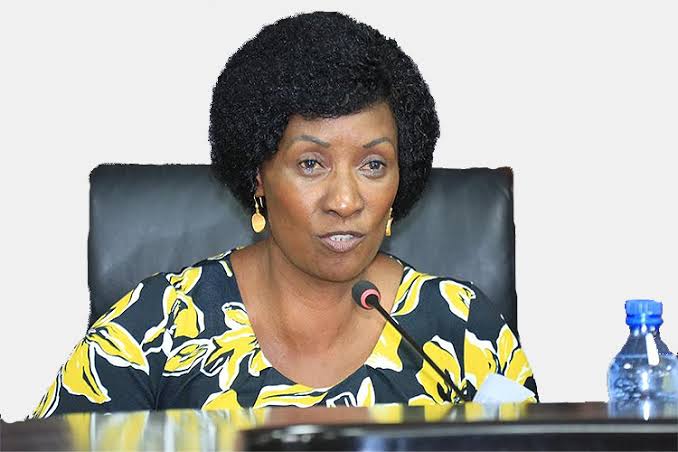In a surprising yet inevitable announcement, Teachers Service Commission (TSC) Chief Executive Officer Nancy Macharia has revealed her plans to step down early next year, marking the end of her decade-long tenure. Appointed in June 2015 and extended in 2020, Macharia’s leadership has been nothing short of a rollercoaster ride, drawing both applause and criticism from various stakeholders in Kenya’s education sector.
While addressing the Kenya National Union of Teachers’ (KNUT) Annual General Meeting, Macharia’s tone was a mixture of gratitude and reflection. “Sincerely, I have no words to express my most profuse appreciation to Knut for the utmost professionalism with which you have dealt with me over the last nine years,” she stated. As her time at the helm nears its conclusion, she reminisced about the achievements and challenges that defined her leadership. However, the legacy she leaves behind is as much about her triumphs as it is about the controversies that dogged her term.
Macharia vs. KNUT: A Tense Relationship
Macharia’s tenure will be remembered for the sharp differences she had with KNUT, particularly with its former firebrand leader, Wilson Sossion. Their most notable conflict arose during the rollout of the Competency-Based Curriculum (CBC), a reform that divided opinions across the sector. Sossion accused the TSC of sidelining teachers in critical decision-making processes and failing to provide adequate training for the CBC.
Another bone of contention was the introduction of Career Progression Guidelines (CPGs) for teacher promotions. KNUT preferred the long-standing Teachers’ Code of Regulations and Schemes of Service. This dispute escalated to the courts, with KNUT securing a victory. However, the triumph was bittersweet, as the aftermath left the union significantly weakened. The TSC, under Macharia, ceased deducting and remitting union dues, a move that crippled KNUT financially. Furthermore, the commission promoted only non-KNUT members, prompting an exodus of teachers from the union.
This strategic maneuvering led to the resignation of Sossion, who left amid immense pressure. His successor, Collins Oyuu, adopted a less confrontational approach, even calling off a strike planned for August 2024 at the eleventh hour. Reflecting on this evolving dynamic, Macharia stated that TSC had engaged in more than 10 exclusive consultations with KNUT this year alone, signaling a thaw in the once-icy relations.
Achievements Amidst Controversies
Despite the disputes, Macharia’s tenure was not devoid of significant milestones. One of her most celebrated accomplishments was the signing of the first Collective Bargaining Agreement (CBA) between teachers and their employer. Under her leadership, the TSC institutionalized CBAs, ensuring a more structured approach to negotiations.
Additionally, Macharia spearheaded the introduction of a comprehensive health insurance cover for teachers, a move that was both lauded and criticized. While the initiative was seen as a step toward improving teacher welfare, it faced numerous challenges in implementation, including delays and inefficiencies in service delivery.
Another feather in her cap was the professionalization of the teaching service. Macharia championed reforms aimed at enhancing the quality of education, though these were often met with resistance from some quarters.
A Polarizing Legacy
Macharia’s legacy is a tale of two extremes. On one hand, she ushered in transformative changes that set a precedent for her successors. On the other, her hardline stance on union matters alienated a significant portion of the teaching fraternity. The introduction of the CPGs, while intended to streamline promotions, has been widely criticized for causing stagnation among teachers in the same job groups for years. This dissatisfaction has lingered and continues to fuel grievances among educators.
The strained relationship with KNUT, particularly during Sossion’s tenure, remains a dark spot on her record. Critics argue that her leadership style was too authoritarian, prioritizing institutional goals over the welfare of teachers. However, her supporters commend her for maintaining the TSC’s autonomy and ensuring that the commission did not bow to external pressures.
Looking Ahead
As Macharia prepares to exit the stage, the focus shifts to her successor and the path forward for the TSC. The challenges facing the commission are far from over. Issues such as teacher promotions, funding for education reforms, and improving the CBC’s implementation will require decisive leadership.
Macharia’s farewell message was one of optimism and goodwill. “I wish you the very best as you work to elevate the teaching profession to even higher standards,” she told KNUT members. Her departure marks the end of an era, but the debates surrounding her legacy are likely to persist for years to come.
In the end, Nancy Macharia’s story is one of a leader who navigated turbulent waters with resilience and determination, leaving behind a legacy that will be dissected and debated by stakeholders in Kenya’s education sector for decades. Whether history will judge her kindly or harshly, one thing is certain—she leaves behind a tenure that is as impactful as it is polarizing.





